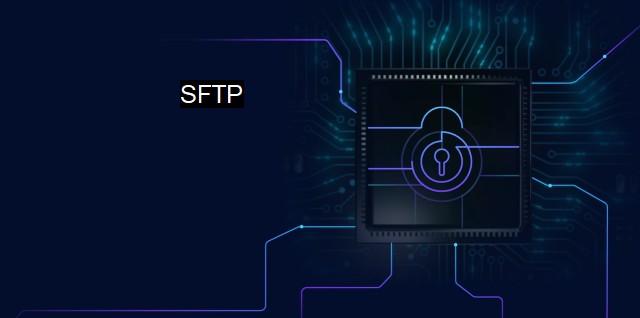What is SFTP?
Understanding SFTP in Cybersecurity and Antivirus Technologies: A Comprehensive Guide
SFTP, an acronym for SSH File Transfer Protocol, or Secure File Transfer Protocol, is a network protocol that provides file access, file transfer, and file management over any reliable data stream. Typically used with the Secure Shell (SSH) protocol, SFTP is widely employed by businesses to conveniently and securely exchange data across different networks.Security is one of the primary concerns in today's technological and internet-driven era. As cybersecurity threats evolve, it is more critical than ever for individuals and organizations to ensure their digital documents and transactions are secure. In this context, SFTP has gained high importance in the cybersecurity infrastructure.
Although SFTP and FTP (File Transfer Protocol) share a similar name, these two are quite distinct. While FTP sends information in plain text, which makes data susceptible to theft by cybercriminals, SFTP uses secure shell (SSH), which encrypts data before transferring, ensuring that the data is unreadable if intercepted. SFTP hence provides enhanced security to FTP functionalities, making it a favourable choice in critical business environments where sensitive data is transferred.
Using public-key cryptography, the Secure Shell protocol provides robust authentication and secure data transfers. Public-key cryptography utilizes two keys: a private one and a public one. The private one is stored securely on the client system, whereas the public one is put on the server. A secure, encrypted session is established if these two keys match.
Regarding antivirus protection, some might question how SFTP can have any impact. The relationship between secure file transfer and antivirus software hinges on the idea that safe and secure data transfers reduce the exposure to potential malware, viruses, or other cyber threats.
Given that SFTP encrypts data, it makes it less likely for malicious software to attach to it or for cybercriminals to retrieve usable information during the transfer. SFTP indeed may not perform the task of an antivirus program like scanning and prohibiting the download of harmful files. Still, it can contribute significantly to the antivirus strategy of reducing the visibility of sensitive data to potential hackers.
SFTP also offers more than mere file transfer. It includes services for file management and file access, making it more versatile when interacting with a remote file system. You can do such things as view file directories, remove files from remote locations, and move files, enhancing the control over your remote data operations.
SFTP provides additional features like resuming interrupted transfers, directory listings, and remote file removal. It doesn't have to worry about IP spoofing or data stream modification due to its secured transmission. Also, SFTP provides both manual and automatic server host key management, which results in more secure and efficient data transfers.
Another significant benefit of SFTP is its firewall-friendly nature. Because it only uses one connection — as opposed to FTP, which uses at least two — it is simpler to tunnel through a firewall. It uses the standard SSH port and streamlines the difficulty of configuring a firewall for SFTP usage.
SFTP reflects the progress in modern cybersecurity response to the growing malware and data theft threats worldwide. With advantages like secure encrypted transfers, better user authentication methodologies, firewall survivability, and robust file management functionality, SFTP acts as a strong wall against cybersecurity threats. Particularly in combination with other proactive measures like antivirus software, SFTP can significantly reduce the risk of data loss, theft, or corruption, making it an integral part of any comprehensive cybersecurity strategy.

SFTP FAQs
What is SFTP and how is it used in cybersecurity?
SFTP, or Secure File Transfer Protocol, is a network protocol that allows for the secure transfer of data over a network. In cybersecurity, SFTP is commonly used to transfer sensitive data between servers, clients, and other network-connected devices. It encrypts any data that is transferred, providing an additional layer of security against unauthorized access.Is SFTP more secure than traditional FTP for file transfers?
Yes, SFTP is more secure than traditional FTP for file transfers. Unlike FTP, SFTP uses encryption to protect data that is transferred over the network, making it much more difficult for cybercriminals to intercept and steal sensitive information. It also uses Secure Shell (SSH) protocols to authenticate users and ensure that only authorized users have access to the data being transferred.Can SFTP be used to transfer files infected with malware?
SFTP is not designed to prevent the transfer of malware-infected files. However, many antivirus programs are capable of scanning files that are transferred via SFTP and detecting any malware that may be present. Therefore, it is important to have an antivirus program in place to scan files before and after they are transferred via SFTP.How can I set up SFTP for file transfers in my organization?
Setting up SFTP for file transfers in your organization requires configuring a server and client to use SFTP. This involves installing and configuring an SFTP server program, generating public and private key pairs, and creating user accounts with the appropriate permissions. It is recommended to consult with IT professionals or cybersecurity experts to ensure that SFTP is properly set up and configured for maximum security.| | A | | | B | | | C | | | D | | | E | | | F | | | G | | | H | | | I | | | J | | | K | | | L | | | M | |
| | N | | | O | | | P | | | Q | | | R | | | S | | | T | | | U | | | V | | | W | | | X | | | Y | | | Z | |
| | 1 | | | 2 | | | 3 | | | 4 | | | 7 | | | 8 | | |||||||